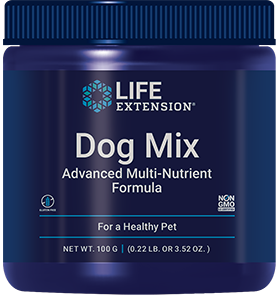
Fish Oil for Dogs: Skin & Coat Benefits
Published: January 2024
Fish oil. You've likely heard these two words often; they've been part of the wellness lexicon for decades, touted by doctors, friends and family as a go-to for whole-body health.
And for those of us who are not fans of sardines, mackerel, anchovies or any other cold-water fish, fish oil supplements are a godsend. You can find them everywhere from neighborhood pharmacies to online superstores; they're a safe, easy and reliable way to get more of the benefits of wild-caught fish than from our menus alone.
Luckily for pet parents, there are also fish oil supplements that are formulated for dogs. Like those supplements recommended for humans, high-quality fish oil supplements for dogs contain a pure, high-potency omega-3 fish oil. The eicosapentaenoic acid (EPA) and docosahexaenoic acid (DHA) support skin and fur health.
But maybe you're wondering if you should just give your dog your fish oil—or should you add some leftover salmon to its feed? Here's everything you need to know about omega-3 fatty acids from fish and your four-legged friend.
Pro tip: If you're considering adding any type of dietary supplement to your dog's daily routine, you'll want to check in with your vet first.
What are the benefits of fish oil for dogs?
Fish oil helps support the condition of your fur baby's coat, making it appear silkier, shinier and fluffier. This isn't just about maintaining an eye-catching mane, though. As anyone who collects body lotions by the dozen can attest, there is nothing worse than skin discomfort! The same is true for our dogs.
Fortunately, fish oil can play an important role in comforting a dog's skin. The omega-3 fatty acids, specifically EPA and DHA, are vital for skin health and comfort. Fish oil is especially helpful for those dogs with sensitive skin; the essential fatty acids in fish oil help relieve occasional skin discomfort, especially for sensitive skin.
Can you give a dog human fish oil?
We don't recommend this. Human fish oil supplements may be sourced in much the same way as pet supplements, but they are not intended for dogs. That's because human fish oil supplements may have added ingredients that may not be safe for your pooch. Plus, fish oil formulated for dogs will ensure your cuddle muffin gets the correct dose.
Should my dog eat fish?
Assuming your vet doesn't tell you otherwise, a little bit of fish is a far healthier type of table scrap to slip to your pet than whatever else is on your plate! EPA and DHA can occur naturally in fish like sardines and certain anchovy. These could be yummy treats for your dog to snack on and may be fine in small quantities.
Just make sure to consult with your vet when making this, or any other adjustments to your dog's diet. Pro tip: A homemade pumpkin treat can also be an excellent way to give your pooch the nutrients they need to support their health, including a shiny coat!
What Are Omega-3 Fatty Acids?
There are three main types of omega-3s: docosahexaenoic acid (DHA), eicosatetraenoic acid (EPA) and alpha-linolenic acid (ALA). While omega-3s are well-known, they are not the only type of essential fatty acids; you will also find omega-6, omega-7 and omega-9 fatty acids (the numbers refer to their molecular structure).
Omega fatty acids are complex, healthy fats that are crucial to your dog's well-being (and yes, we need these fats, too!). Dogs can't produce omega fatty acids in their body, so they must get them from a nutrient-rich diet. A well-balanced dog food will most likely contain fats that are high in omega-6 fatty acids as well as some omega-3 fatty acids. To ensure your pet is getting enough, quality supplements containing omega fatty acids are key to supporting the health and comfort of your dog's skin and coat.
How much fish oil is good for dogs?
Supplying omega-3s, particularly DHA and EPA, through fish oil supplements is a convenient way to give your dog's skin and coat health a much-needed boost. The dosage of omega-3s you give your dog will depend on various factors—their weight, age, lifestyle and health status are all necessary to keep in mind. Normally, the fish oil supplement will list dosage information on the label. However, your veterinarian will confirm what's right for your specific pet.
In general, fish oil supplements are safe for our four-legged friends to use daily. It is crucial to chat with your dog's veterinarian so they can confirm if adding fish oil supplements to your dog's nutrition regimen is the optimal way to address any skin or coat concerns.
Whatever fish oil supplement you choose—liquid or soft chews that can be given orally or mixed into dog food—make sure it comes from a reputable source with the right combination of ingredients like EPA and DHA.
Can dogs have fish oil every day?
Theoretically, yes. Again, you'll want to get on the same page with your dog's veterinarian regarding the daily dosage of fish oil—your vet will be able to calculate the exact amount your pooch needs based on their current body weight. Your vet is your trusted source on your dog's health and will know exactly how much fish oil is needed.
While it can take a few weeks for your dog to reap the full effects of fish oil, the improvements to their skin and hair will be gradual but noticeable—for example, you may notice they spend more time playing and less time scratching those occasional itches!
And just a friendly reminder: Always pay attention to how your dog reacts to any dietary changes; if you notice your dog isn't behaving like his or her normal self, contact your vet for guidance. It's never a bad idea to discuss vitamins and supplements with your veterinarian, especially as your dog ages. Fish oil supplements are just one of many ways to help your dog live a more comfortable life.
References
- Arford K. "Fish Oil for Dogs." American Kennel Club. November 2023. https://www.akc.org/expert-advice/nutrition/fish-oil-for-dogs/
- Gollakner R. "Fish Oil." VCA Animal Hospitals. https://vcahospitals.com/know-your-pet/fish-oil
- Llera R, et al. "Coat and Skin Appearance in the Healthy Dog." VCA Animal Hospitals. https://vcahospitals.com/know-your-pet/coat-and-skin-appearance-in-the-healthy-dog
- Mick L. "Fish Oil for Dogs." PetMD. August 2023. https://www.petmd.com/dog/general-health/fish-oil-dogs
Always be in the know!
Access the latest deals, wellness news, expert health tips & more!








